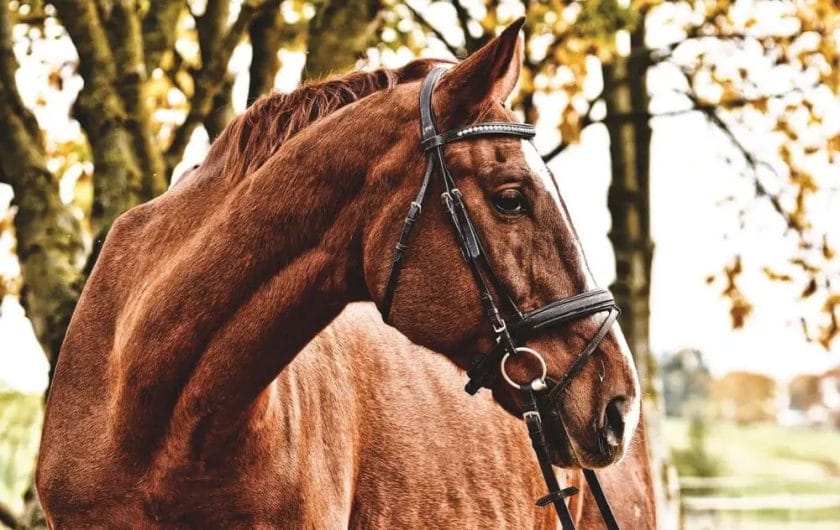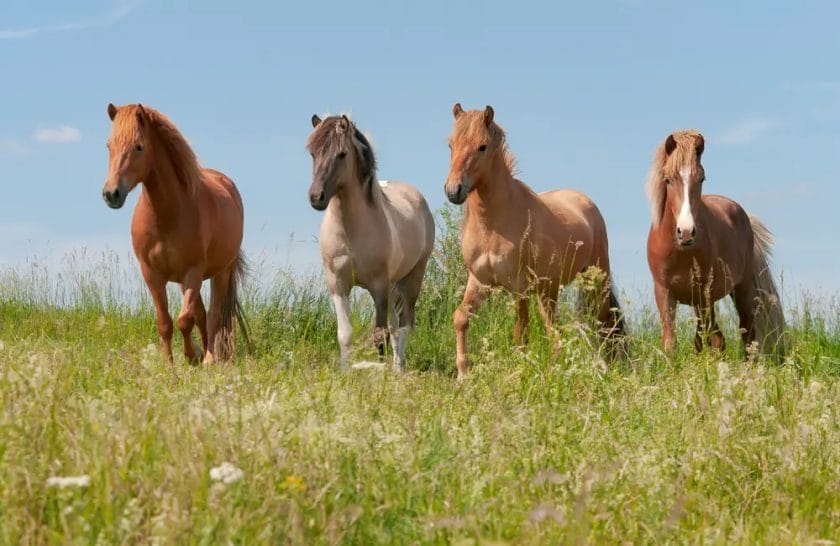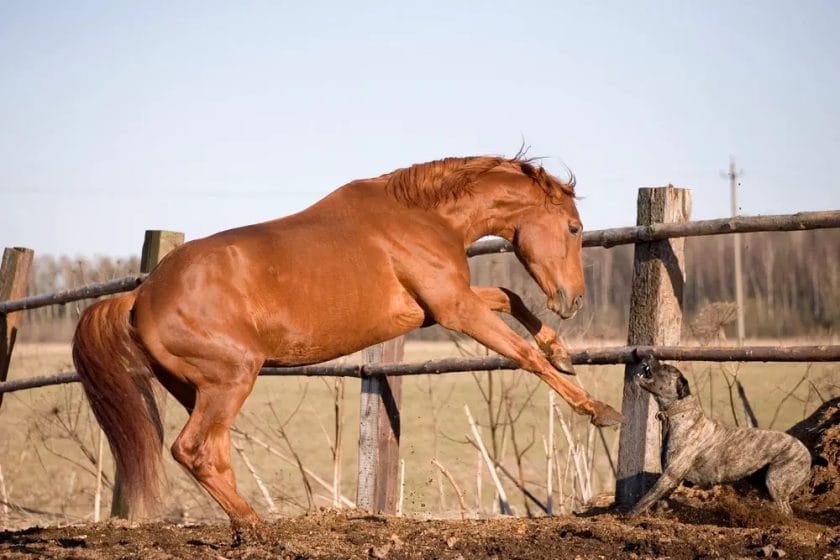Horses have a natural instinct to be wary of their surroundings, including potential threats like snakes. While not all horses may be afraid of snakes, many horses will react with fear or caution upon encountering one. This is because snakes can pose a danger to horses if they are bitten. The fear of snakes is likely a result of their natural flight response and self-preservation instincts. Consequently, it is essential for horse owners and riders to be mindful of the presence of snakes and take appropriate precautions to ensure the safety of their equine companions.

Snake Phobia in Horses: How and Why Horses Develop a Fear of Snakes
Horses, majestic creatures known for their strength and grace, are not immune to fears and phobias. While some horses may be brave and fearless in the face of various stimuli, others may develop specific fears or phobias, such as a fear of snakes. In this section, we will delve into the fascinating topic of snake phobia in horses, exploring how and why these animals develop such a fear.
1. Understanding Phobias
Before we can explore why horses develop a fear of snakes, it is important to understand what a phobia is. A phobia is an excessive or irrational fear of a specific object, situation, or creature that poses little to no actual danger. Phobias can develop in both humans and animals, and they can be triggered by a variety of factors, including past negative experiences, genetic predisposition, or learned behavior.
2. Evolutionary Factors
Horses, as prey animals, have evolved with a heightened sense of awareness and sensitivity to potential threats in their environment. This heightened awareness was essential for their survival in the wild. Snakes, with their stealthy movements and potentially venomous bites, represent a natural threat to horses. Therefore, horses may have an innate predisposition to fear snakes as a survival mechanism.
3. Learned Behavior
In addition to evolutionary factors, horses can also develop a fear of snakes through learned behavior. If a horse has had a negative experience with a snake in the past, such as encountering one unexpectedly or witnessing a snake bite another animal or human, it may associate that fear and danger with all snakes. This learned association can then generalize to a fear of all snakes, even if the initial negative experience was isolated.
4. Sensory Perception
Horses have highly developed senses, including keen eyesight and acute hearing. These senses allow them to perceive even subtle movements and sounds in their surroundings. Snakes, with their sinuous movements and hissing sounds, can trigger a horse’s senses and cause a fear response. The unpredictable nature of snake movements and the lack of warning signs may further contribute to a horse’s fear and anxiety.
5. Environmental Influence
The environment in which a horse is raised and exposed to various stimuli can also play a role in the development of snake phobia. If a horse has limited exposure to snakes or has only encountered them in situations associated with fear or danger, such as during a natural disaster or while being chased by a predator, it may develop a heightened fear response towards snakes.
6. Treatment and Management
Snake phobia in horses can have a significant impact on their well-being and performance. Fortunately, there are various approaches to help horses overcome their fear of snakes. Desensitization and counter-conditioning techniques, where horses are gradually exposed to snakes in a controlled and positive manner, can help them build confidence and reduce their fear response. Working with a professional trainer or equine behavior specialist is often recommended to ensure the safety and effectiveness of the training process.
In summary, snake phobia in horses can arise from a combination of evolutionary factors, learned behavior, sensory perception, and environmental influence. Understanding the underlying reasons for a horse’s fear of snakes is essential in helping them overcome this phobia and live a healthier, happier life.

Overcoming Horse’s Fear of Snakes: Effective Training Techniques and Strategies
Horses are majestic creatures known for their strength and agility. However, they can also be prone to fears and phobias, just like humans. One common fear that horses may have is of snakes. This fear can be detrimental to their well-being and can even pose a danger to both the horse and its rider. Therefore, it is important for horse owners and trainers to address and overcome this fear through effective training techniques and strategies.
Understanding the Horse’s Fear
Before delving into the training techniques, it is crucial to understand why horses fear snakes in the first place. Horses are prey animals by nature, and their survival instincts are wired to perceive certain stimuli as potential threats. Snakes, with their slithering movement and sudden appearance, can trigger a flight response in horses. This fear is often rooted in their instinctual need to escape from perceived danger. By acknowledging and empathizing with the horse’s fear, trainers can approach the training process with patience and understanding.
Desensitization Training
One effective technique for overcoming a horse’s fear of snakes is desensitization training. This method involves gradually exposing the horse to the feared stimulus in a controlled environment. It is important to start with less threatening stimuli and gradually progress to more realistic representations of snakes. This can be done using visual aids such as pictures or videos of snakes, followed by introducing the horse to snake-like objects such as ropes or hoses. The goal is to gradually desensitize the horse to the presence and movement of snakes.
During the desensitization process, it is crucial to maintain a calm and reassuring demeanor. Horses are highly attuned to their handler’s emotions, and any signs of stress or anxiety can increase their own fear response. By remaining calm and confident, trainers can help instill a sense of trust in the horse and facilitate the learning process.
Positive Reinforcement
Another effective strategy for overcoming a horse’s fear of snakes is through positive reinforcement. Rewarding the horse for calm and appropriate behavior in the presence of snakes helps to reinforce positive associations and build confidence. This can be done through treats, praise, or even a gentle pat on the neck. It is important to reward the horse immediately after it displays the desired behavior, as this helps to reinforce the connection between the behavior and the reward.
Gradual Exposure and Repetition
When training a horse to overcome its fear of snakes, it is essential to proceed gradually and allow for repetition. Each horse is unique, and their ability to overcome fear may vary. It is important to respect the individual horse’s pace and progress at a speed that is comfortable for them. By gradually increasing the exposure to snakes and revisiting the training exercises regularly, the horse can become more confident and eventually overcome its fear.
Seeking Professional Guidance
While some horse owners may feel confident in addressing their horse’s fear of snakes on their own, it is always advisable to seek professional guidance. Working with an experienced horse trainer or behaviorist can provide valuable insight and support throughout the training process. They can assess the horse’s specific needs and tailor the training techniques accordingly. Additionally, they can provide guidance on safety measures and ensure that both the horse and handler are protected during the training sessions.
In Summary
Overcoming a horse’s fear of snakes requires patience, understanding, and effective training techniques. Through desensitization training, positive reinforcement, gradual exposure, and seeking professional guidance, horse owners and trainers can help their horses overcome this fear. By addressing this fear, horses can regain their confidence and ensure a safer and more enjoyable riding experience for both horse and rider.

Equine Safety Measures: Preventing Snake Encounters and Minimizing Horse Anxiety
When it comes to keeping our horses safe and minimizing potential dangers, it’s important to consider not only the physical safety measures but also the emotional well-being of our equine friends. One particular concern that horse owners often have is snake encounters. In this section, we will explore some effective strategies to prevent snake encounters and minimize horse anxiety.
1. Clearing and Maintaining the Surrounding Areas
One of the first steps to prevent snake encounters is to clear and maintain the surrounding areas of the horse’s living space. Snakes are often found in tall grass, brush, or cluttered areas. By regularly mowing the fields, removing debris, and keeping the surroundings clean, we can reduce the likelihood of snakes making their home near our horses.
2. Snake-Proof Fencing
Installing snake-proof fencing is another effective measure to prevent snake encounters. Unlike regular fencing, snake-proof fencing is designed to keep snakes out by using smaller mesh openings and burying the fence several inches into the ground. This creates a barrier that prevents snakes from slithering in and posing a potential threat to the horses.
3. Natural Snake Deterrents
Using natural snake deterrents can be a helpful tool in keeping snakes away from the horse’s environment. Certain plants, such as marigolds, lemongrass, and wormwood, have been known to repel snakes due to their strong scent. Planting these around the horse’s pasture or barn can act as a natural barrier against snakes.
4. Regular Inspection and Maintenance
Regular inspection and maintenance of the horse’s living space are essential to identify any potential snake hiding spots or entry points. It’s important to routinely check for cracks in walls, gaps under doors, or any other possible openings that snakes could use to enter the area. By addressing these issues promptly, we can prevent snakes from entering and causing anxiety to our horses.
5. Education and Awareness
Equipping ourselves with knowledge about local snake species, their habits, and potential dangers is crucial in preventing snake encounters. Understanding which snakes are venomous and knowing how to identify them can help us take appropriate precautions. Additionally, educating barn staff, riders, and visitors about snake safety measures can create a safer environment for everyone involved.
6. Minimizing Horse Anxiety
Horses can become anxious when they encounter snakes or perceive potential threats. To minimize horse anxiety, it is important to create a calm and secure environment for them. Some strategies include:
- Providing adequate turnout time in a well-maintained and snake-proofed paddock.
- Ensuring horses have access to sheltered areas where they can retreat if they feel threatened.
- Using natural calming supplements or herbal remedies under veterinary guidance.
- Using positive reinforcement training techniques to build trust and confidence in horses, reducing their overall anxiety levels.
By implementing these equine safety measures, we can significantly reduce the chances of snake encounters and help our horses feel more secure in their surroundings. However, it’s important to remember that prevention is key, and if you suspect a snake bite or encounter, it is crucial to seek immediate veterinary assistance.
Equine Psychology: Exploring the Relationship between Horses and Snakes
In the world of equine psychology, one fascinating aspect to explore is the relationship between horses and snakes. Horses are naturally prey animals, while snakes are commonly perceived as predators. This unique dynamic between the two species sparks curiosity and raises questions about how horses perceive and interact with snakes.
Horses and Their Prey Instincts
Horses have evolved as prey animals, constantly on the lookout for potential threats in their surroundings. Their survival instincts rely heavily on their ability to detect and respond to perceived dangers. This heightened sense of alertness and sensitivity is crucial for their survival in the wild.
When it comes to snakes, horses may instinctively view them as potential predators due to their natural camouflage, stealthy movements, and the potential danger they pose if bitten. This innate fear of snakes triggers a unique psychological response in horses.
The Fear Response in Horses
When confronted with a snake or the presence of one, horses often exhibit a fear response. This can include behaviors such as freezing in place, snorting, and attempting to flee from the perceived threat. Horses may also display signs of heightened anxiety, such as increased heart rate and sweating.
The fear response in horses is an important survival mechanism that has been ingrained in their genetic makeup over generations. It is essential for their protection from potential predators. However, it is crucial to note that not all horses react the same way to snakes, as individual temperament and past experiences can also influence their responses.
Training and Desensitization
Understanding the equine psychology behind the fear of snakes can be beneficial for horse owners, trainers, and handlers. By gradually exposing horses to controlled and safe environments where they can encounter snakes, a process known as desensitization can be initiated.
Desensitization involves introducing horses to the presence of snakes in a controlled manner, allowing them to become familiar with these creatures without triggering a fear response. This process helps horses learn that snakes are not necessarily a threat and reduces their anxiety levels when encountering them in the future.
Professional trainers and equine behaviorists use various techniques during desensitization, such as introducing horses to visual representations of snakes, playing snake sounds, and utilizing positive reinforcement to reward calm behavior. This gradual exposure and positive association help horses overcome their instinctual fear and develop a more neutral or even positive response to snakes.
Benefits of Understanding Equine Psychology
Gaining insights into the relationship between horses and snakes not only helps in addressing and managing fear responses but also enhances overall horsemanship skills. Understanding equine psychology allows horse owners and handlers to create a safer and more comfortable environment for their horses.
Furthermore, by recognizing the impact of instinctual behavior and fear responses, new training techniques and approaches can be developed. This leads to more effective and humane methods of working with horses, promoting their well-being and fostering a stronger bond between horses and their handlers.
In Summary
Equine psychology offers a fascinating lens through which to explore the relationship between horses and snakes. Horses’ natural prey instincts and fear responses to snakes highlight the significance of understanding their psychology for effective training and handling. By incorporating desensitization techniques, horse owners and handlers can help horses overcome their fear and develop a more neutral or positive response to snakes. This understanding of equine psychology ultimately contributes to better horsemanship and a stronger bond between horses and their human counterparts.
FAQs
Are horses afraid of snakes?
Yes, horses are generally afraid of snakes because they perceive them as a potential threat. Snakes can startle or bite them, causing injury or even death. It is important to keep horses away from snakes to ensure their safety.
How much water should a horse drink in a day?
A horse should drink approximately 5 to 10 gallons of water per day. The exact amount depends on factors such as the horse’s size, age, activity level, and weather conditions. Providing clean and fresh water at all times is essential for a horse’s health and well-being.
What should I feed my horse?
Horses should have a diet primarily consisting of forage, such as hay or pasture. It is important to provide them with high-quality hay and ensure they have access to fresh water. Depending on their activity level and nutritional needs, you may also need to supplement their diet with grains and minerals.
Conclusion:
In conclusion, the fear of snakes in horses is a widely debated topic in the equestrian community. While some horses may show signs of fear or avoidance towards snakes, not all horses react in the same way. It is important for horse owners and riders to be aware of their horse’s individual temperament and behavior when it comes to encountering snakes.
Additionally, proper training and desensitization techniques can help horses overcome their fear of snakes and other potentially frightening stimuli. Building a strong bond and trust with your horse through positive reinforcement can also contribute to minimizing their fear response.
Remember, each horse is unique, and understanding and addressing their fears will ultimately lead to a safer and more enjoyable experience for both horse and rider.
